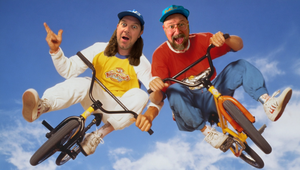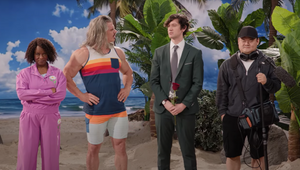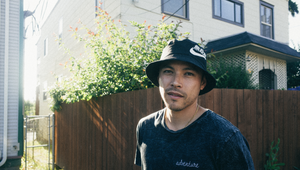
The Directors: Sylvie Weber

Sylvie's films are steeped in poetic realism, like a delicate recording of the emotional conditions of humanity, its virtues and weaknesses. They often inherit a magical twist by taking refuge in her own paradise – her imagination. Of German-Dominican descent, questions of belonging have been a driving force in her filmic exploration. Her ability to bend genres and seamlessly navigate between formats is often fueled by a focus to shift our gaze and rework historical injustice. Her debut short, The Prophetess, has won and traveled several film festivals around the globe.
Name: Sylvie Weber
Location: Mexico City / Berlin
Repped by/in: REVERIE Content in the US, Primo in Mexico, CommonPeople Films in the UK
Awards: Bucharest Fashion Film Festival (Best Fashion Film); Athens Short Film Festival (Best Short Doc); Dumbo Film Festival (Best Short Doc)
LBB> What elements of a script sets one apart from the other and what sort of scripts get you excited to shoot them?
Sylvie> Scripts that ignite my curiosity are those with the capacity to transcend traditional storytelling and weave metaphorical layers. Even though I love experimenting with various visual techniques, I'm particularly drawn to scripts that go beyond aesthetics and take me into uncharted territories or convey a message of moral and social significance.
LBB> How do you approach creating a treatment for a spot?
Sylvie> I usually kickstart the process by free-writing, letting my ideas flow onto the page without overthinking. This helps me forge a genuine connection with the project. I'm often drawn to intertwined narratives, which can sometimes overcomplicate the script, so my biggest challenge is crafting a script that is both simple and captivating. I then review my image library or notes of shots I've always wanted to try and see if I can integrate them. After the first assembly, I send it to my image researcher/treatment designer, who arranges the deck, and I add the finishing touches.
LBB> If the script is for a brand that you're not familiar with/don't have a big affinity with or a market you're new to, how important is it for you to do research and understand that strategic and contextual side of the ad? If it's important to you, how do you do it?
Sylvie> When working on a script for an unfamiliar brand, thorough research and understanding of the brand's philosophy are essential to see if our core values align. I like to actively engage with the client, asking lots of questions to avoid miscommunication. So as long as there is room for creative freedom and the project's message resonates with me, I'm not fixated on a brand's level of establishment.
LBB> For you, what is the most important working relationship for a director to have with another person in making an ad? And why?
Sylvie> The most crucial working relationships are with my producer and assistant director (AD). They need to have a problem-solving positive mindset, give you honest feedback while protecting your ideas, and maintain overall good energy on set. Shoots can quickly become hectic and a whirlwind of time constraints. It's a dance between the director's artistic vision and the agency's objectives - so someone I can trust, I can be vulnerable with, and who remains cool in the face of chaos is absolutely essential for me.
LBB> What type of work are you most passionate about - is there a particular genre or subject matter or style you are most drawn to?
Sylvie> From a young age, I've been weaving imaginary worlds and fantastical stories in my head (as a child, I believed that I once flew!). Even today, I feel closely connected with my dreams, which often inspire me. There's something about poetic realism, abstract and surreal environments, that just feels right to me. It allows me to delve into the mysteries of our past and present them in a way that feels most authentic and compelling. These are the worlds in which I find a sense of comfort and freedom. I also genuinely care about projects that make a positive impact and carry moral or socio-political significance. Projects that combine both are my absolute favorite but rare these days.
LBB> What misconception about you or your work do you most often encounter and why is it wrong?
Sylvie> The most common misconception about my work is that I'm primarily focused on documentaries, which can pigeonhole me into the realm of branded content within the commercial world. While I started out in that genre, I'm curious about a diverse range of topics and styles primarily rooted in narrative storytelling.
I can find equal excitement in directing a car or football commercial as I do in creating a fashion or beauty piece. I'm particularly interested in infiltrating traditionally male-dominated or perceived male-oriented spaces. I don't like to limit myself, and that's what film is all about to me – experimentation and breaking barriers.
In essence, my work reflects my personal growth and willingness to explore uncharted territories regardless of certain categories, which can sometimes make it hard to gain a client's trust.
LBB> What's the craziest problem you've come across in the course of a production – and how did you solve it?
Sylvie> In commercials, I haven't encountered any crazy problems outside of the regular madness on set or in post-production. However, I have worked on a project commissioned by a broadcaster during the pandemic, which was extremely mentally draining and difficult to produce. It became an ongoing nightmare with multiple stakeholders involved, constant internal changes, and frequent shifts in creative direction, all of which were beyond our control. At the same time, my creative partner and I were trying to protect the sensibility of the subject and the protagonist's integrity, which was very difficult. It's been three years now, and we have invested significant time and energy into it. This can sometimes lead people to assume that you haven't been working much lately, and it puts you under a lot of financial pressure. So this project taught me a lot about the value of work (which is not Instagrammable) and the importance of perseverance.
LBB> How do you strike the balance between being open/collaborative with the agency and brand client while also protecting the idea?
Sylvie> The collaborative nature between different creative minds is what I love about filmmaking. But honestly, in the beginning, I've often compromised my creative vision out of fear of missing opportunities. Starting as a self-taught director, I just tried to get a foot in the door and soak up as much knowledge from those with more expertise - I still am. Constant compromises can leave you dissatisfied, though. This path is all too familiar, particularly for marginalized directors who, due to a lack of support and guidance, often must seize whatever chances come their way. Ultimately, building confidence in your vision and gaining clients' trust takes time. It's about creating an energy in the room where everyone's perspectives are valued so the best ideas can flourish. So yes, it's a dance between listening to valuable input, respectfully advocating for your ideas, and sometimes letting go completely and moving on if ideas don't align.
LBB> What are your thoughts on opening up the production world to a more diverse pool of talent? Are you open to mentoring and apprenticeships on set?
Sylvie> The commercial world, in particular, can be quite challenging for talents with diverse backgrounds to break into. Representation is vital for the growth and evolution of filmmaking, and it has to start right from the pitching phase. Unfortunately, a significant lack of trust exists when awarding jobs to newcomers or exploring unknown terrain. Agencies and clients often rely on past work as a benchmark, creating a barrier for those who have yet to be given the opportunity to showcase their abilities. People need to remember commercials are a practice, not just an industry. It's a skill that you develop over time.
Sharing resources and experiences with others can be incredibly valuable. Just reading a few mind-blowing, big-budget pitches that friends shared with me made a huge difference, as for the longest time, I didn't have any examples or guidance on how it all worked. So, even though I'm still navigating my own path in commercials, I've had the privilege of mentoring emerging directors in the past by providing feedback on scripts, inviting them on set, or just chatting about experiences, as I firmly believe in the principle of "your success is my/our success."
LBB> How do you feel the pandemic is going to influence the way you work into the longer term? Have you picked up new habits that you feel will stick around for a long time?
Sylvie> The pandemic has shifted my perception of time and place a bit. I've always known that I thrive in solitude (I've never really been bored in my own company), but I had forgotten just how profoundly pure stillness, particularly when immersed in nature, can flourish my creativity on a subconscious level. In a world obsessed with constant productivity, I've learned to trust the power of introspection and tranquility more. I've also discovered that I dislike directing remotely and rediscovered my love for handwritten, scented letters with my pen pal in London during the lockdown.
LBB> Your work is now presented in so many different formats - to what extent do you keep each in mind while you're working (and, equally, to what degree is it possible to do so)?
Sylvie> I try not to be overly consumed by technicalities on set. I care about storytelling first, but of course, I have to keep different formats in mind during shoots if they are requested.
LBB> What's your relationship with new technology and, if at all, how do you incorporate future-facing tech into your work (e.g. virtual production, interactive storytelling, AI/data-driven visuals etc)?
Sylvie> We're in a moment where the power dynamics between humans and AI are rapidly shifting. The potential of future-facing tech is fascinating, but it also feels like we're jeopardizing ourselves and our creative future; it's a bit scary. Max Tegmark said it perfectly: "We're rushing towards a cliff, but the closer we get, the more scenic the views are."
There's pressure to stay up-to-date, especially as I hear more directors using AI for their treatments and projects. However, for me, creating from an honest and pure place takes time and genuine emotion. This is because I put my whole body into it, so rushing through certain processes feels counterintuitive, a bit like cheating.
LBB> Which pieces of work do you feel really show off what you do best – and why?
Sylvie> My favorite pieces are the ones that focus more on poetic storytelling rather than the product itself.
"The Art of Value," commissioned by cosmetic brand Dr. Hauschka for Designer William Fan, was a lot of fun as the brand gave us complete trust and creative freedom. Each creative involved had a strong voice; that's when the magic happens.
I also like our poetic piece for the shoe brand Ayede, which didn't showcase the product at all. Instead, it focused on conveying a feeling the brand wanted to evoke.
On the less commercial side, my short film "The Prophetess," commissioned by Journalists For Human Rights, was an experience I will never forget. Shooting in the DR Congo with a small team and a civil war nearby presented some challenges, yet it was the most intuitive, honest, and spiritual collaboration I've ever experienced. Despite the topic's heaviness, it was a joy for everyone creating this piece because we had time to build authentic connections, and you see that in front of the camera.
Our music video for my friend Nalan was a labor of love as well. The scenes are mostly based on my own dreams, and I'm proud of how much we achieved with a tiny budget. I highly recommend Turkey as a shooting location - great crews, and you'll find the most interesting locations.















